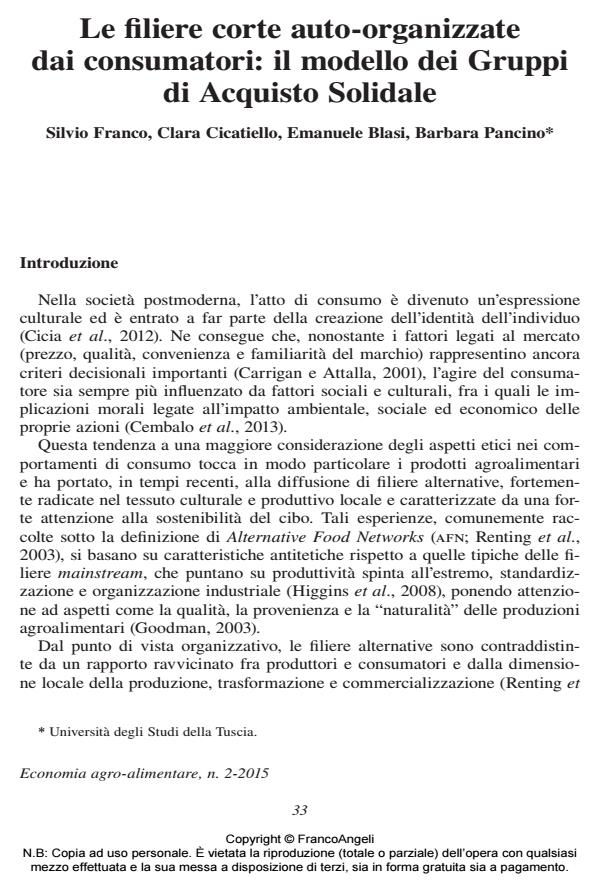Consumers’ self-organized short food chains: Solidarity Purchase Groups model
Journal title ECONOMIA AGRO-ALIMENTARE
Author/s Silvio Franco, Clara Cicatiello, Emanuele Blasi, Barbara Pancino
Publishing Year 2015 Issue 2015/2
Language Italian Pages 24 P. 33-56 File size 189 KB
DOI 10.3280/ECAG2015-002003
DOI is like a bar code for intellectual property: to have more infomation
click here
Below, you can see the article first page
If you want to buy this article in PDF format, you can do it, following the instructions to buy download credits

FrancoAngeli is member of Publishers International Linking Association, Inc (PILA), a not-for-profit association which run the CrossRef service enabling links to and from online scholarly content.
Consumers’ decisions are increasingly influenced by ethical issues. In the food domain it has led to the spread of alternative food supply chains. These innovative food networks, deaply embedded in the local domain, are characterized by a strong focus on food sustainability. Among them, the initiatives promoted and selforganized by consumers are particularly interesting as they disclose a high potential of fostering wider social changes. In this context, Solidarity Purchase Groups (called gas after the Italian acronym) emerge as spontaneous associations of consumers with strong ethical motivations including environmental, economic and social issues, which are fast-spreading in Italy. The aim of this paper is twofold. On the one hand, looking at consumers, we analyze the profile of the Italian consumers who participate to gass, in order to more precisely identify the target of these experiences, on the base of a large survey held in Italy on short food chain consumers; on the other hand, from a strategic and operational level, we discuss how these innovative supply chain models are organized, drawing from data retrieved for the 117 gas s operating in the city of Rome. The results show that gas participants have some specific features compared to consumers shopping in other alternative food chains, both in the socio-demographic profile and in their purchasing behavior, which is characterized by a strong ethical motivation. Looking at the organizational models of the gas s of Rome, the results of the survey confirm that the social dimension is very important in the management of these groups, as well as the principles at the base of their constitution, which very often refer to environmental concerns about farming techniques, social commitment to the local community and trust-based relations with the producers. Nevertheless, beside the social and environmental concerns, the economic dimension is still very important, as shared purchases most of the time results in a significant reduction in prices. The evidences confirm that the gas model represents a very interesting object of analysis for economists. Indeed, gas s are an unique example of completely demand-pull innovative food chain. Besides, they are able to involve consumers with specific needs and a strong ethical motivation underpinning the food purchase.
Keywords: Solidarity purchase groups, short food supply chains, ethical consumerism; food purchase motivations
Jel codes: Q13, M31
Silvio Franco, Clara Cicatiello, Emanuele Blasi, Barbara Pancino, Le filiere corte auto-organizzate dai consumatori: il modello dei Gruppi di Acquisto Solidale in "ECONOMIA AGRO-ALIMENTARE" 2/2015, pp 33-56, DOI: 10.3280/ECAG2015-002003